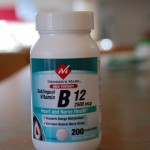I've been reading a number of articles about Vitamin B-12 lately. One convinced me we should be taking a higher dose at our age. In young people B-12 deficiency is rare; that's not true for the elderly where some have estimated up to 15% may be lacking in this essential nutrient. What I hadn't fully realized is the omeprazole (Prilosec) I take chronically could potentially also block absorption of B-12.
B-12 deficiency, when severe, causes macrocytic anemia, low red blood cell counts with the cells themselves being larger than normal. That's the flip side of iron-deficiency anemia where the cells are smaller than usual. But there are a host of other issues attributed to B-12 deficiency: depression, dementia, confusion, appetite loss, balance problems. All those have many other causes, of course.
We had been taking a multivitamin for seniors, but added high-dose B-12, (1500 mcg/day. Like the rest of the B vitamins, B-12 is water soluble and if one takes "too much' it can be excreted in urine. That's not true for fat-soluble vitamins like Vitamin D where the potential for overdose is worth thinking about (although there is ongoing debate as to how much Vitamin D we should be getting; see my last post). Our senior vitamin mixture has 25 mcg of B-12 or about 4 times the recommended daily (RDV) value for young healthy adults, but I don't care if I take more than that since I'm about to turn 70 and take that proton pump blocker omeprazole.
Today the Wall Street Journal in its Health and Wellness section had an article about B-12 deficiency. It is more likely to be seen in people who don't eat meat or dairy products (beef liver has 48 mcg/slice which is 800% of the RDV). Several chronic bowel diseases (e.g., celiac disease) can lower its absorption.
The Institute of Medicine recommends that anyone in their 50s or older get most of their intake of this essential vitamin from supplements or, alternatively from so-called "fortified" cereals. When I looked at the NIH's lists of foods that contain larger amounts of B-12, I was somewhat surprised to see at least eight cereals listed.
There is a blood test for B-12 with normal levels of 200-800 picograms per milliliter cited as the normal range. But my own doc just said my level was superb, ~1,000 pcg/ml in January of 2009. There are now B-12 nasal sprays and some people with severe deficiency have to get B-12 shots, but she talked to a hospital pharmacist who said, just tell me to take my Prilosec at a different time of the day than my B-12.
So if you are 70+ or have a chronic bowel disease or are a vegan, you may want to ask your physician about a B-12 level.


